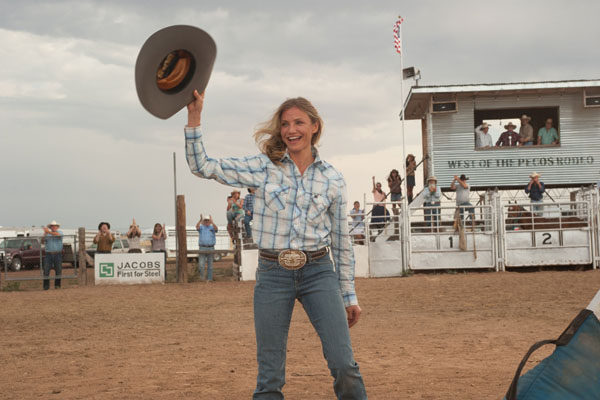The star of Gambit, it seems, is the Savoy. And why not? Nobody else seems to want to lay claim to this movie, a refashioning of the 1966 art con caper that starred Michael Caine. Not even Colin Firth, who spends a fair amount of time in the new film unhappily legging it, trouserless, up and down the hotel’s refurbished corridors.
If you want to make an artistic copy, it had better be really good or you might as well not try, is the inadvertent message of this film. Scriptwriters the Coen brothers have taken the basic elements of the vintage Caine vehicle, which also had Shirley Maclaine, and made a crude sketch whose plot is paper-thin and whose characters are pencilled in. It’s a shame because, besides Firth, Gambit also boasts Cameron Diaz, Alan Rickman, Tom Courtenay and Stanley Tucci — and all their star power is wasted on the hammy lines and half-hearted plot. Everyone seems to be phoning in their performance from a more interesting movie set somewhere else.
Firth plays Harry Deane, a tweedy art curator who can no longer stand working for his overbearing boss Lord Lionel Shahbandar (Rickman), the richest man in England and an ardent fan of Impressionism. Deane concocts a scheme to trick Shahbandar into purchasing a fake Monet (one of the ‘Haystacks’ series). To do so, he recruits rodeo winner P.J. Puznowski (Diaz) who, one surmises, had been blissfully happy until then plucking chickens on a Southern farm. Deane wants the smart-talkin’, homily-spoutin’ Puznowski to come to London and pose as a woman whose grandfather liberated a Monet painting after the second world war. She is to say that she’s had a ‘Haystack’ sitting in her family home all the while. The painting, of course, will be a fake — done by the master forger known as the Major (Courtenay).
So Puznowski comes to town, and for reasons of plot contrivance has to be put up at a historic luxury hotel. This is so her innocent and disarming hokeyness can be played against elegant but mirthless British surroundings, you see. Cue the Savoy, and numerous hotel scrapes that have been done infinitely better in movies such as (the original) Pink Panther. There’s the obligatory Diaz-in-lingerie scene and a tiresome few minutes where snooty Savoy staff wait for a bill to emerge from a printer. Perhaps the only chortle-inducing sequence is when Firth weaves his way through lobby, hallway and suite, clutching a Ming vase. Predictably, he ends up on a window ledge. He watches his trousers waft down towards the Strand, their fall broken by Savoy topiary. From then on it’s strictly ending-up-in-a-stranger’s-room-without-my-trousers-on territory, but rendered relatively fresh by Firth’s deadpan delivery.
The movie’s level of desperation escalates further, with a farting scene, pidgin-English-speaking Japanese businessmen, a dapper German art expert (Tucci) and a cursorily handled Venetian masque ball. A lion is, literally, roped in. Rickman is given two nude scenes too many.
It appears that the famous Coen duo couldn’t be bothered to direct their own film, fobbing it off on Michael Hoffman instead. Hoffman’s most recent film was The Last Station, about the final days of Tolstoy’s life, so he probably isn’t the right person to direct what’s meant to be a zippy caper. In his hands, the Coens’ clunky script becomes clunkier, the characters almost unenduringly caricatural. No outdated cultural trope is left unturned.
To say that Diaz lays on the Southern accent with a Texan-sized trowel would be putting it mildly. She doesn’t so much inhabit the role as lasso it and try to wrestle it into submission. Her character doesn’t look fun, it looks like hard work. Firth fares better, but then he’s used to playing the hapless Englishman. There’s no chemistry at all between the two leads, that special US-UK relationship that has borne many a comedy here being either undetectable or, worse, grating.
The scenes with the Japanese businessmen (Puznowski suggests they all do a bit of karaoke! Yay!) are embarrassing, and suggesting that the Japanese are stereotyping themselves in order to execute a con job of their own doesn’t make things better. Rickman plays the typical magnate who is ruthless with staff, boorish with women, mercenary in all his undertakings and who masks his various eccentricities as hobbies. Tucci’s German is as you would expect, ja.
Then, of course, there is the Englishman who, as we all know, is cultured but uptight. He has no qualms about making counterfeits but has a problem with sex. So here he is in this movie, keeping a stiff upper lip even when the bottom half of his suit is missing. He pretends that his trousers are there. Life is pants but must go on.
It’s a level of stoicism that might help you, should you decide to watch this movie.






Comments